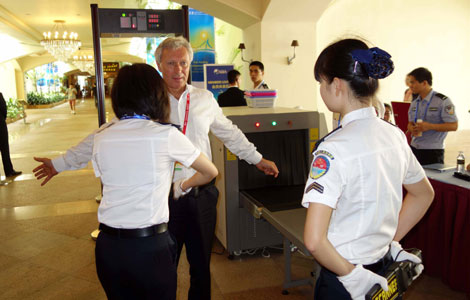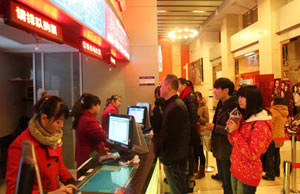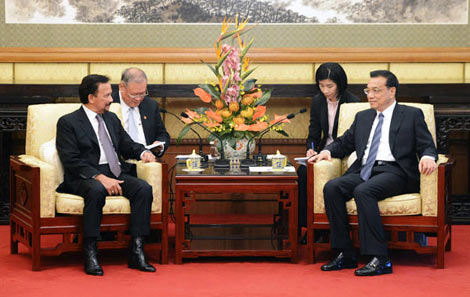
Reporter's Log >> Liu Xiangrui
Along the narrow streets often streaming with slow-moving vehicles in the Ugandan capital of Kampala, distinctive Chinese elements flashed by as we entered the city.
Restaurants, hotels, factories and shops owned by Chinese businessmen and even government offices built with Chinese donations are often seen in the capital city largely built upon hills of green.
In the five days we stayed in Uganda as members of the Chinese delegation for the Experience China program in Uganda, an exchange initiated by the State Council Information Office, we had a chance to hang out in town and find out about the Chinese presence in Kampala.
Though Chinese faces are relatively limited, visitors will be surprised to find that on William Street and its adjacent streets in Kampala, the community has such a high concentration of Chinese residents that it looks like a mini-Chinatown.
Hundreds of Chinese shopkeepers who left home to seek a fortune here are clustered in the small area.
The population and shops keep growing, and some Chinese even started doing business specifically among themselves, such as barbering and selling box lunches.
Small businesses have become harder to run in recent years, as many local residents joined the competition. Some local shopkeepers even made accusations against their Chinese counterparts.
Despite that, the inflow of Chinese products have greatly benefited local people's daily lives, though they might occasionally complain about counterfeits bearing "Made in China" logos.
Hats, shoes, luggage cases, and other things are among the items that the Chinese shop owners sell, and the affordable products have attracted retailers from across Uganda and even neighboring countries to replenish their supplies.
Chinese businessmen and local employees loading goods onto trucks in the narrow streets are common scenes there. They are trucked even to the furthest rural regions.
Abubaker Basajjabaka, a local businessman, says that in addition to the cheap and diverse goods, local people have learned to appreciate the hardworking, tenacious Chinese people through their daily interactions with each other.
Ugandans' perceptions of China are shifting, in large part thanks to the country's media.
"There is increasing interaction between Uganda and China and a growing mutual understanding as people from both countries visit each other. More journalists are visiting China and coming back with interesting stories," says Barbara Kaija, editor-in-chief at Vision Group, a Ugandan media company.
"For a long time, China was closed, and for people who did not have a chance to go there, they could not understand what China was like," says Kaija.
Victoria Ssekitoleko says she has learned that "China can produce all kinds of products to suit different needs, from the most economical ones to those with the best quality", only after she worked in China for the Food and Agriculture Organization of the United Nations.
Sam Kutesa, minister of foreign affairs of Uganda, says he believes the growing number of Chinese in Uganda will foster better mutual understanding between the two countries.
Kutesa says he expects greater cooperation in the economic, educational, social and cultural areas between the two nations.
"China and Uganda have free and mutually beneficial trade and investments. We are excited about the opportunities," Kutesa says.
"We encourage more Chinese business people to come. It is important they also involve Ugandans in the investment so that knowledge is passed on to them."
Uganda is interested in upgrading its infrastructure, and has been dealing closely with the Chinese government to accomplish that, he adds.
"We'd like to copy what China has been able to achieve in such a short time, both in rebuilding the country and in making its economy vibrant," he says.
Contact the writer at liuxiangrui@chinadaily.com.cn
 'Cat model' to dazzle Shanghai auto show 2013
'Cat model' to dazzle Shanghai auto show 2013
 Models at Tokyo modified car show
Models at Tokyo modified car show
 Shanghai Fashion Week focuses on domestic brands
Shanghai Fashion Week focuses on domestic brands
 Angel-dress models at Shandong auto show
Angel-dress models at Shandong auto show
 Safe and Sound
Safe and Sound
 Theater firms scramble for managers
Theater firms scramble for managers
 Premier pledges closer ties with Brunei
Premier pledges closer ties with Brunei
 Volkswagen's all-new GTI at New York auto show
Volkswagen's all-new GTI at New York auto show